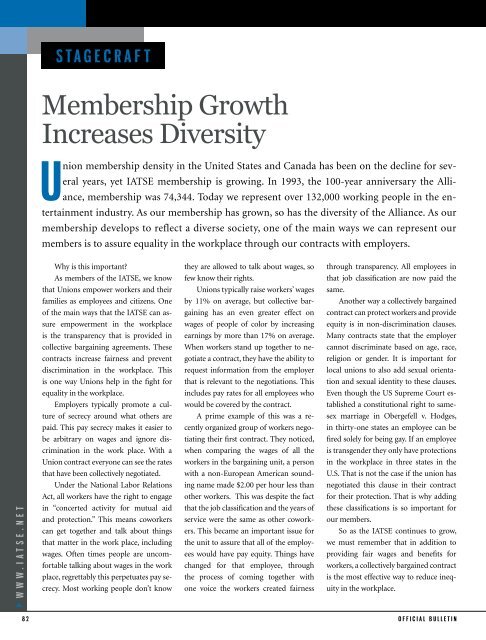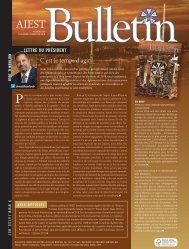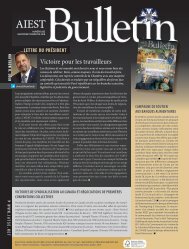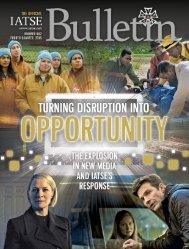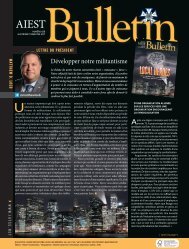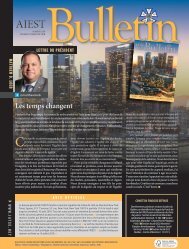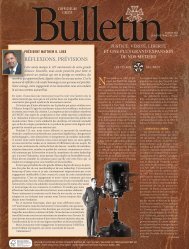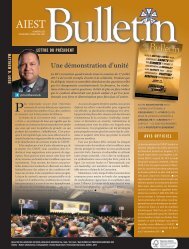IATSE_1st2017_web
You also want an ePaper? Increase the reach of your titles
YUMPU automatically turns print PDFs into web optimized ePapers that Google loves.
STAGECRAFT<br />
Membership Growth<br />
Increases Diversity<br />
Union membership density in the United States and Canada has been on the decline for several<br />
years, yet <strong>IATSE</strong> membership is growing. In 1993, the 100-year anniversary the Alliance,<br />
membership was 74,344. Today we represent over 132,000 working people in the entertainment<br />
industry. As our membership has grown, so has the diversity of the Alliance. As our<br />
membership develops to reflect a diverse society, one of the main ways we can represent our<br />
members is to assure equality in the workplace through our contracts with employers.<br />
WWW.<strong>IATSE</strong>.NET<br />
Why is this important?<br />
As members of the <strong>IATSE</strong>, we know<br />
that Unions empower workers and their<br />
families as employees and citizens. One<br />
of the main ways that the <strong>IATSE</strong> can assure<br />
empowerment in the workplace<br />
is the transparency that is provided in<br />
collective bargaining agreements. These<br />
contracts increase fairness and prevent<br />
discrimination in the workplace. This<br />
is one way Unions help in the fight for<br />
equality in the workplace.<br />
Employers typically promote a culture<br />
of secrecy around what others are<br />
paid. This pay secrecy makes it easier to<br />
be arbitrary on wages and ignore discrimination<br />
in the work place. With a<br />
Union contract everyone can see the rates<br />
that have been collectively negotiated.<br />
Under the National Labor Relations<br />
Act, all workers have the right to engage<br />
in “concerted activity for mutual aid<br />
and protection.” This means coworkers<br />
can get together and talk about things<br />
that matter in the work place, including<br />
wages. Often times people are uncomfortable<br />
talking about wages in the work<br />
place, regrettably this perpetuates pay secrecy.<br />
Most working people don’t know<br />
they are allowed to talk about wages, so<br />
few know their rights.<br />
Unions typically raise workers’ wages<br />
by 11% on average, but collective bargaining<br />
has an even greater effect on<br />
wages of people of color by increasing<br />
earnings by more than 17% on average.<br />
When workers stand up together to negotiate<br />
a contract, they have the ability to<br />
request information from the employer<br />
that is relevant to the negotiations. This<br />
includes pay rates for all employees who<br />
would be covered by the contract.<br />
A prime example of this was a recently<br />
organized group of workers negotiating<br />
their first contract. They noticed,<br />
when comparing the wages of all the<br />
workers in the bargaining unit, a person<br />
with a non-European American sounding<br />
name made $2.00 per hour less than<br />
other workers. This was despite the fact<br />
that the job classification and the years of<br />
service were the same as other coworkers.<br />
This became an important issue for<br />
the unit to assure that all of the employees<br />
would have pay equity. Things have<br />
changed for that employee, through<br />
the process of coming together with<br />
one voice the workers created fairness<br />
through transparency. All employees in<br />
that job classification are now paid the<br />
same.<br />
Another way a collectively bargained<br />
contract can protect workers and provide<br />
equity is in non-discrimination clauses.<br />
Many contracts state that the employer<br />
cannot discriminate based on age, race,<br />
religion or gender. It is important for<br />
local unions to also add sexual orientation<br />
and sexual identity to these clauses.<br />
Even though the US Supreme Court established<br />
a constitutional right to samesex<br />
marriage in Obergefell v. Hodges,<br />
in thirty-one states an employee can be<br />
fired solely for being gay. If an employee<br />
is transgender they only have protections<br />
in the workplace in three states in the<br />
U.S. That is not the case if the union has<br />
negotiated this clause in their contract<br />
for their protection. That is why adding<br />
these classifications is so important for<br />
our members.<br />
So as the <strong>IATSE</strong> continues to grow,<br />
we must remember that in addition to<br />
providing fair wages and benefits for<br />
workers, a collectively bargained contract<br />
is the most effective way to reduce inequity<br />
in the workplace.<br />
82 OFFICIAL BULLETIN


